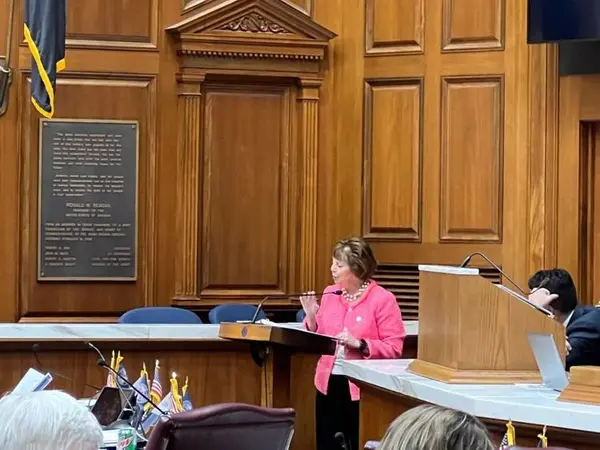Senate Bill 1, striving towards improving third-grade reading levels, passed out of the House although 24 Democrats and three Republicans voted no on Tuesday.
The bill would require schools to offer summer school courses for students who are not reading proficiently or who are at risk of not reading proficiently as indicated by an evaluation approved by the Indiana State Board of Education. The author of the bill, Sen. Linda Rogers, R-Granger, stated the goal for SB 1 is that “every child learns to read.”
IREAD is the test that indicates a third-grader’s reading level. It is a standardized test that was developed to measure whether third-grade students have the foundational reading skills to advance to the fourth grade.
“There were 14,000 students who did not pass in 2023, and as a state, we retained 410,” Katie Jenner, Indiana secretary of education, said in a committee meeting.
When a student is retained, the child will have to repeat the same grade level for another year.
Rogers further explained the problem in the committee meeting: “Consistently, every single year, about one in five students in Indiana can’t read effectively by the end of third grade. This is not acceptable. If a child hasn’t learned basic reading skills by that point of school, they’re going to struggle to learn almost every other subject.”
Third-graders’ reading rates have been declining for a decade. The percentage dropped 9.5 points from the highest-ever proficiency rate of 91.4% during the 2012-2013 school year, according to the Indiana Department of Education.
Jenner, inspired by Mississippi’s leap in reading test scores after implementing similar legislation—termed “the Mississippi miracle”—said Indiana should train teachers in the science of reading. “They jumped significantly in reading, and it started with supporting and training teachers,” Jenner said.
According to The Associated Press, “Mississippi went from being ranked the worst state in 2013 for fourth-grade reading to 21st in 2022.”
Rep. Vernon Smith, D-Gary, voted nay on this bill, afterward telling The Statehouse File his suggestions for improving it.
“The research has shown that if you really want to solve this problem, you need to have early learning. You need to have preschool for students, students of color, students of poverty, English language learners,” he says.
“Secondly, we’ve destroyed our teaching profession with all these bills that pass by attacking teachers, disrespecting teachers, blaming teachers and so forth. And as a consequence, we have a teacher shortage. So, we have people who are in classrooms who are not qualified to be teachers. And so, if they haven’t been taught how to teach, how do you expect them to be effective in the classrooms? Until we get effective people in classrooms, we are not going to improve this situation.”
Rogers, the bill’s author, said the first step will be for the Indiana Department of Education to inform parents of children in kindergarten of the program, including the retention policy.
“Schools will start requiring the IREAD test to be taken by the second graders. If the student in second grade passes the test, they will not have to take it again in the third grade,” Rogers said. “If the student does not pass the test in second grade, it will be offered in summer school and given remediation support for their entire third-grade year before taking the test again.”
Rogers continued: “The student will need to pass the IREAD in the spring of their third-grade year or end of summer if necessary. If the student still can’t demonstrate they can pass IREAD, which is written at a second-grade level, then Indiana will have a retention policy preventing these students from passing to the fourth grade.”
Rogers emphasized that the bill isn’t about holding students back.
“Retention is the absolute last option, if we tried all other methods,” Rogers said.
Smith and every other Democrat besides three Republicans voted no on the bill. Smith’s reason was because of the retention policy; his amendments, which called for intervention, all failed.
When the bill was in committee, several people voiced their concerns and suggested possible improvements.
Danielle Coulter with the Indiana Speech-Language-Hearing Association, said, “We have not found much evidence saying that this helps students. In fact, we see a lot of negative impacts on students settling within assessment results. Instead, these results should be used to monitor students over time.”
Coulter continued: “We would like to see a couple expanders, so currently exempting those with intellectual disabilities, visual disabilities, children who have trouble sleeping, swallowing … and sometimes it can take ESL (English as a second language) students five-to-seven years to develop true fluency.”
Terry Spradlin, executive director for the Indiana School Board Association, suggested the bill start in two years.
“Because we’ve heard that not all teachers are getting trained in the science of reading,” Spradlin said. “Shouldn’t we have that expectation first before we allow students to be trained in the sciences in the classroom because of the provisions of the bill? But as a last resort, we must wait two years before implementation.”
SB 1 passed out of the Senate Feb. 1 with a roll call of 36 yays and 13 nos.
Now that SB 1 has passed both chambers, if the author on the Senate side approves of the changes that the House made, then the bill goes to the governor’s desk. If the author doesn’t approve, there will be a conference committee where lawmakers from both sides will try to come up with a compromise.
Smith has hopes that the bill author in the Senate will not approve of the bill and fix the concerns he has.
“And I’m hoping that it happens so we can try to get that retention out,” he said.










